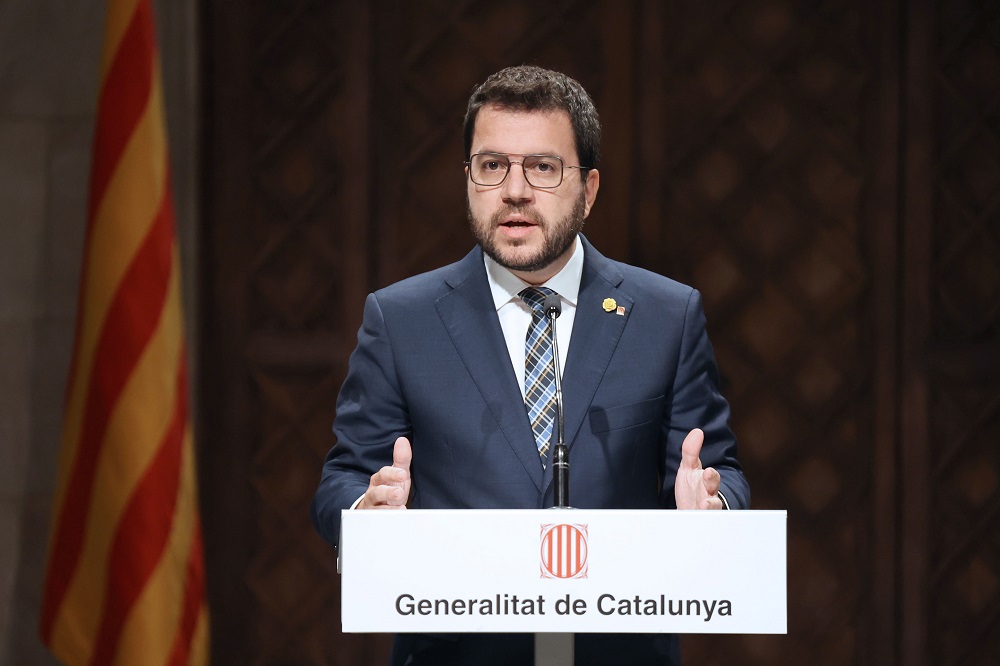Catalonia’s coalition government collapses over lack of progress towards independence

Luke James
Less than two years after a historic election victory for pro-independence parties in Catalonia, the country’s coalition government has collapsed in a dispute over how to deliver on their mandate.
Pro-independence parties won over half of the popular vote for the first time in last February’s elections, a result described as “the greatest victory for independentists since the restoration of democracy” by the spokesperson of Junts per Catalunya (Together for Catalonia).
But last night Junts announced that they have quit the government led by their coalition partner, Esquerra Republicana (Republican Left), because of the lack of progress towards independence.
In an internal referendum, 55.7% of Junts members voted for their party to quit the government compared to 42.4% who wanted to stay. “Our activists don’t want to be in a government that’s not moving towards independence,” said Junts president Laura Borràs of the results.
It leaves the government with just 33 of 135 seats in Catalan parliament, a record low, but President Pere Aragones said he had no intention of calling an election.
In a televised statement, the country’s youngest ever president said fresh elections would be irresponsible at a time of economic and social crisis and announced his plans to appoint replacement ministers to a “new government that is 100% dedicated to serving citizens from the first minute”.
‘Great split’
It was a dramatic moment despite having been foreseeable since the elections.
Esquerra and Junts stood on a joint ticket as recently as the 2015 elections as part of the push for a referendum but the fallout from the brutally repressed 2017 poll exposed ideological and tactical differences.
At the most recent elections, Esquerra promised to secure a new referendum through dialogue with the Spanish government while Junts promoted an unital path to independence.
“You’ve got a great split in the independence movement between those around Esquerra Republicana, who believe, in my view correctly, that the only way to achieve independence is to build a bigger social majority,” Catalan history expert Dr Andrew Dowling told Nation.Cymru in a recent interview.
“The other side represented by Junts and [former Catalan president Carles] Puigdemont, a very factional formation in itself, which says ‘one last push. One last heave. We failed in 2017, if we do the same thing again this time, independence is in the bag’.”
Although Aragones said his new government would “ensure citizens can freely decide the future of Catalonia”, the end of the coalition with Junts coupled with the economic crisis means constitutional issues are likely to be lower on its agenda than at any time since Catalonia’s latest independence push began a decade ago.
Particularly if he forms a new coalition with left-wing opposition parties opposed to or neutral on independence, as now appears likely.
‘Progressive majority’
Rather than seeking to bring down the enfeebled government, the leader of the Catalan socialist party, which has the largest number of parliamentarians, said he was ready to do a deal on the forthcoming budget.
“We have to think about the interests of Catalonia and not those of our parties,” Salvador Illa told radio station RAC1.
The president of Catalunya En Comú, the Catalan branch of Podemos, went even further in suggesting a new left-wing coalition government with the cooperation of the Socialist party.
“I’ve said since February 2021, there was a progressive majority possible and I still feel that,” Jéssica Albiach told national broadcaster TV3.
There is a historical precedent for such a coalition. Esqeurra, the Socialist party and a green-left party now part of Catalunya En Comú formed two governments between 2003 and 2010.
By doing so they succeeded in ending the two decades of political hegemony by Junts’ forerunner party, Convergencia, which followed the restoration of democracy.
The Socialist party headed the coalitions on both occasions and, while Aragones is likely to hang on for now, will expect to do so again if they are the largest party at the next Catalan elections as polls predict.
Meanwhile, Junts, with one eye on next May’s municipal elections, will use the freedom of opposition to go further in pinning the blame for a lack of progress towards independence on Esquerra with the hope of regaining the status as the largest independence force.
The predicament facing Aragones was neatly summed-up through song on this week’s edition of Catalonia’s popular political satire show, Polònia. “Socialist party to the rescue. Coalition, the only option…You don’t have a choice, come with us or there’s elections.”
Al rescat arriba el PSC.#PolòniaTV3 pic.twitter.com/7uXguU37sz
— Polònia (@poloniatv3) October 6, 2022
Support our Nation today
For the price of a cup of coffee a month you can help us create an independent, not-for-profit, national news service for the people of Wales, by the people of Wales.




